Redditor Wants to Report His Neighbor to Authorities for Setting Off Fireworks Out of Season and Scaring His Dog, but Fears Retaliation
Fireworks are a staple of celebrations and are often considered symbols of beauty and wonder. The bright colors and stunning displays in the night sky can be mesmerizing to watch.
However, not everyone shares this sentiment, especially animals, which can be negatively affected by loud noises. For many animals, fireworks can be a source of intense anxiety and fear.
Dogs, cats, and other pets can become frightened and confused by the loud explosions, causing them to panic and run away. The distress caused by fireworks can lead to serious health issues, including seizures and heart problems.
OP lives in Michigan, where fireworks are legal but limited to certain days. Despite not being a fan of fireworks himself, he respects the law and the rights of others to use them.
His primary concern is the impact of the loud noises on his dog, who becomes frightened and reluctant to go outside. Recently, a neighbor down the street has been lighting bottle rockets during a time when fireworks are not allowed by law, causing his dog to become even more frightened.
The man wants to address the issue directly with his neighbor but fears retaliation if he involves the authorities. His wife reminded him that this neighbor had previously been charged with abusing his own dog, which only added to his concerns.
He hesitates to report the illegal use of fireworks to the authorities, fearing it may result in further conflict. Read the full story below.
OP asks:

OP lives in Michigan, where fireworks are legal but limited to certain days. Despite not being a fan of fireworks himself, he respects the law and the rights of others to use them.

His primary concern is the impact of the loud noises on his dog, who becomes frightened and reluctant to go outside.
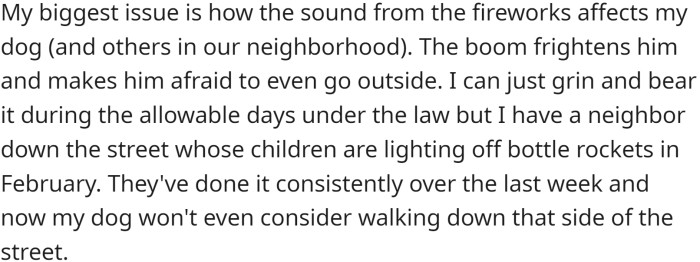
The Intersection of Fear and Responsibility
This situation underscores the emotional complexity of fear in the context of pet ownership. Research in animal behavior shows that loud noises, such as fireworks, can significantly affect a dog's emotional state, leading to anxiety and distress. Studies published in the Journal of Veterinary Behavior highlight that many dogs experience fear responses that can have long-term implications for their emotional health.
In this case, the Redditor's concern for his dog's well-being is a valid emotional response, reflecting a deep bond between owner and pet.
The man wants to address the issue directly with his neighbor but fears retaliation if he involves the authorities.
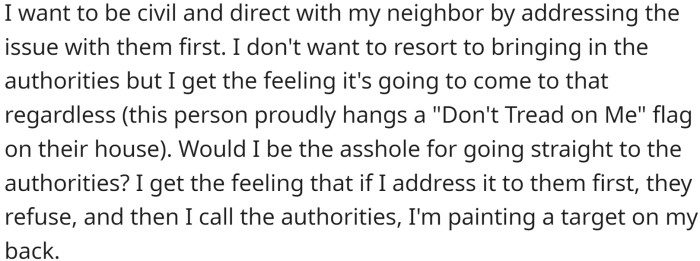
OP added:

It's not just animals that can be negatively impacted by fireworks. For some people, the sounds of fireworks can trigger anxiety or post-traumatic stress disorder (PTSD).
Additionally, loud fireworks can disrupt people's sleep and cause distress to those with sensory issues. It's important to remember that while fireworks may be beautiful to some, they can have a negative impact on others.
Being mindful of the effects that fireworks can have on animals and vulnerable populations is essential. Taking steps such as using noise-canceling headphones, keeping pets indoors, and choosing quieter, less intense fireworks can help mitigate the negative effects of fireworks on both animals and people.
OP has offered the following explanation for why he thinks he might be the a-hole:

Moreover, the concept of anticipatory anxiety can play a significant role in how pet owners respond to perceived threats. Research indicates that when individuals anticipate a stressful event, their emotional responses can heighten, often leading to overreactions in protective situations. A clinical psychologist emphasizes that understanding this dynamic can help pet owners manage their fears more effectively, fostering a calmer environment for both themselves and their pets.
This is a judgment call, and OP knows his neighbors.
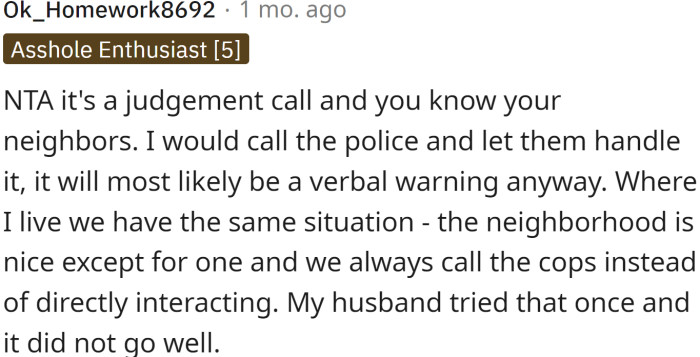
This Redditor shares their experiences:
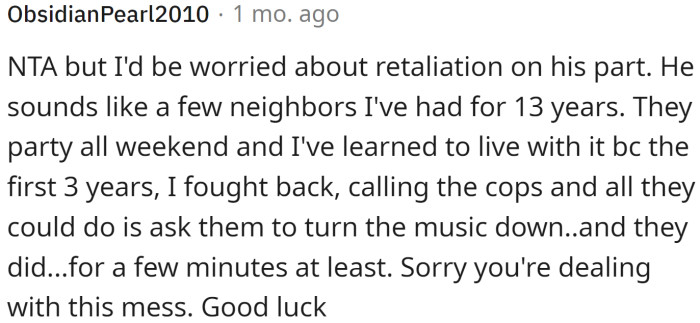
The 'neighborly chat' rarely works.
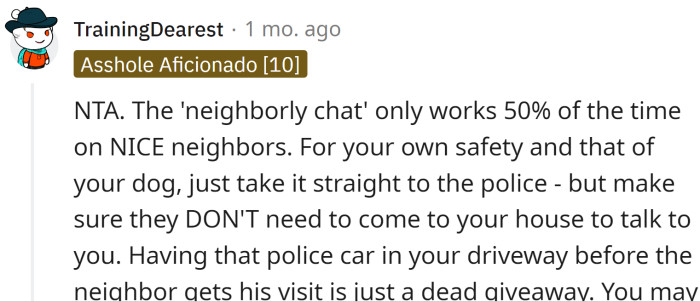
Navigating Neighborly Conflicts with Empathy
To address conflicts with neighbors, establishing a dialogue based on empathy and understanding is crucial. Experts recommend approaching neighbors in a non-confrontational manner, expressing concerns without assigning blame. For example, saying, 'I noticed my dog becomes anxious during fireworks, and I wanted to discuss how we might be able to minimize this impact,' can open up constructive conversations and potential solutions.
Additionally, engaging in active listening allows neighbors to express their perspectives, fostering a sense of community rather than division.
Redditors advise OP to be careful.
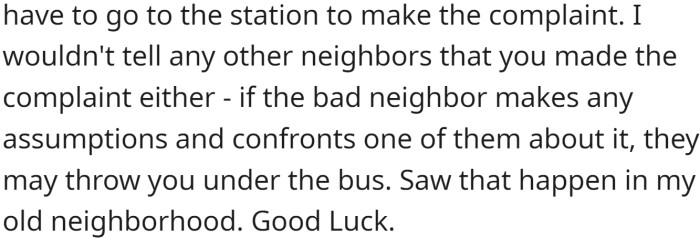
OP is dealing with a neighbor violating the law by setting off fireworks outside the permitted days, which is causing distress to his dog. Given the potential for retaliation, he is torn between addressing the issue directly with his neighbor or involving the authorities.
What would you do?
Furthermore, understanding the emotional components of conflict can lead to more effective resolutions. A study from Yale University found that communities that emphasize empathy and cooperation tend to resolve conflicts more easily. By promoting understanding and respect, neighbors can work together to create a more harmonious environment for everyone, including pets.
Encouraging mutual respect and understanding can help mitigate future conflicts and build stronger community ties.
Psychological Analysis
This situation illustrates the deep bond between pets and their owners, highlighting how fear can drive protective behaviors. Acknowledging the emotional stakes involved can facilitate more effective communication between neighbors, ultimately fostering understanding and cooperation.
Analysis generated by AI
Analysis & Alternative Approaches
This scenario highlights the emotional complexities surrounding pet ownership and neighborly relations. Mental health professionals emphasize the importance of empathy and understanding in resolving conflicts, particularly in community settings.
By fostering open dialogues and mutual respect, individuals can enhance relationships and create more harmonious living environments.



